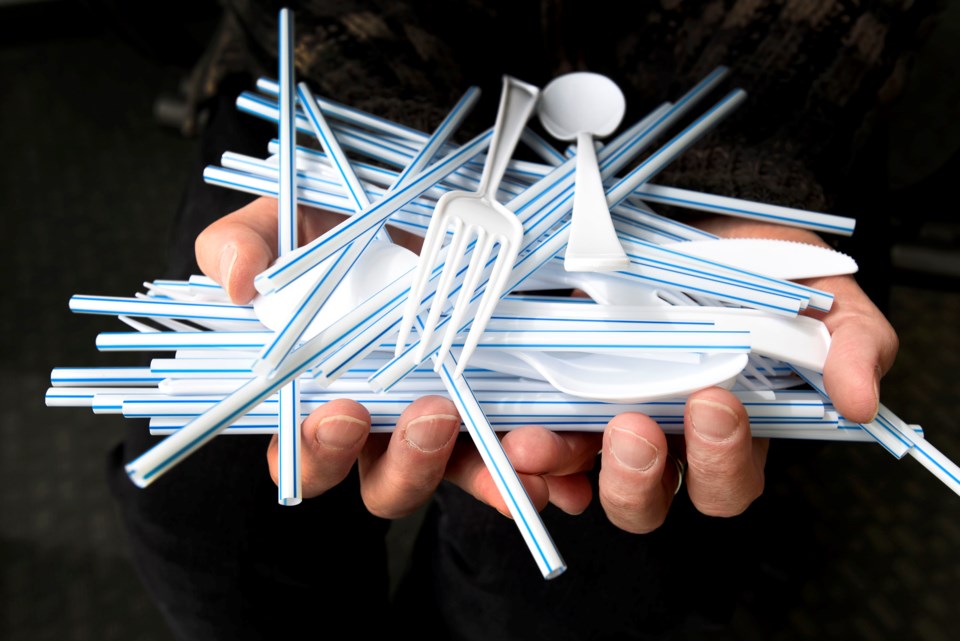St. Albert’s mayor says this week’s proposed national ban on single-use plastics could mean less waste at the curb and more money in your pocket.
Prime Minister Justin Trudeau and Environment and Climate Change Minister Catherine McKenna announced Monday that Canada would ban single-use plastic items as early as 2021 and create national standards for extended producer responsibility plans for plastic products.
Canadians recycle just nine per cent of the plastic they buy each year, McKenna said, speaking in Toronto. The rest ends up in lakes, rivers and oceans, where it’s killing birds and whales and creating microplastic particles that could harm human health. There’s so much plastic waste piling up as a result that studies suggest there will be more plastic in the oceans than fish by 2050.
“Our kids and grandkids deserve to stand on our beaches and alongside rushing rivers and be filled with wonder instead of wondering where all the garbage came from,” McKenna said.
The federal government estimates that about a third of all plastic used in Canada is for single-use or short-term products such as straws and packaging, and that Canadians use some 15 billion plastic bags a year and 57 million plastic straws a day.
McKenna said the federal government would ban harmful single-use plastic items such as straws, plates, cutlery and stir-sticks where the science showed doing so was the best way to manage them, when affordable alternatives were available, and when bans would not affect accessibility, as soon as 2021.
It would also develop national standards for extended producer responsibility (EPR) in co-operation with the provinces to transfer the cost and responsibility for collecting and recycling plastic from municipalities to the companies that create it. This would include targets for recycled content in plastic products.
McKenna said Canadians could prevent some 1.8 megatonnes of heat-trapping pollution a year, save $500 million annually on waste management, and create 42,000 jobs by addressing plastic waste.
“We have an opportunity to turn trash into cash.”
Could mean savings, says Heron
St. Albert Mayor Cathy Heron said in an email and phone interview that she was super excited by this announcement, as she has been studying waste reduction issues as chair of the Alberta Urban Municipalities Association’s environment committee.
“This will most definitely save the City of St. Albert money,” she said, as a federal single-use item ban could let the city claw back some of the $96,000 it had approved to create a single-use item reduction strategy.
Heron said these federal moves could encourage more innovative plastic recyclers to set up shop in St. Albert. A national EPR policy could also result in producers covering the cost to collect and process St. Albert's blue bag recycling through a group like the Canadian Stewardship Services Alliance.
“The $6.54 that sits on your utility bill (for recycling) for the City of St. Albert will disappear,” Heron said.
Even if the city keeps its blue bag program, a single-use item ban would eliminate many problematic items from the blue bag and make recycling more economically viable, Heron said.
Details please?
Melissa Gorrie of Waste Free Edmonton said the federal announcement was a good first step that was short on details. It didn’t say which products would be affected, for example, when the bans would kick in or what would happen if the Liberals lost the election this fall.
Christina Seidel of the Recycling Council of Alberta said she was concerned the “science” requirement for single-use bans could become an excuse not to ban different items.
“The science is there and it’s very clear,” she said. “We just need to get on with it.”
She was also concerned this announcement would cause cities to drop their own plastic waste reduction efforts, despite the fact there’s no clear sign of when these initiatives would kick in.
“Don’t wait for the feds,” she said – anything municipalities do now would simply build on federal efforts.
See bit.ly/2wMBtp0 for details on the federal proposal.




